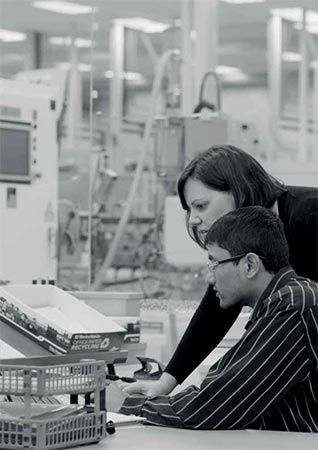Masters scholarships
 The MacDiarmid Institute for Advanced Materials and Nanotechnology is extremely proud to be New Zealand’s premier research organisation in materials science and nanotechnology. At times, Masters studentships are available in our research areas and partnership institutions.
The MacDiarmid Institute for Advanced Materials and Nanotechnology is extremely proud to be New Zealand’s premier research organisation in materials science and nanotechnology. At times, Masters studentships are available in our research areas and partnership institutions.
Successful candidates will become members of the MacDiarmid Institute, and given exciting collaborative opportunities and a thriving environment within which to work.
Our alumni are working all over New Zealand and the world in many different fields and are having real impact. As a MacDiarmid Institute Masters student you will be encouraged and financially supported to take advantage of the many opportunities we provide to broaden your experience and skills.
Activities available for Masters scholarship students include:
- Annual multi-day workshops on specialist topics such as communication, commercialisation and leadership
- Intensive annual multi-day bootcamps (held in remote and beautiful locations) where experts share their knowledge in an important current research area
- Outreach events, working with school teachers or children
- Membership of the MacDiarmid Emerging Scientists Association (MESA), run by students and postdocs, which organises additional activities.
Each scholarship is worth NZD$25,000 per annum (not taxed) plus all domestic student fees.
When Master scholarships are available, more detailed information will be posted on this page.
Externally funded Masters Scholarships
Funded Masters Project in Biopiezoelectricity
We use an enormous number of electronic devices and sensors in society today, and these devices are a considerable waste and recycling burden. Imagine, if we could use biological materials to harvest energy from mechanical motion to power electronic devices? This project fits into a larger, MBIE funded project where we explore the piezoelectric properties of biological materials as a basis for electronic devices.
Eligibility
The perfect student will enjoy problem solving and practical engineering solutions, as well as material science and measurements. Applicants should also satisfy the requirements for admission as a Masters student candidate at the University of Auckland.
Total value and tenure of scholarship
The scholarship is worth $ per annum and includes all student fees for one year.
How to apply
To apply or find out more information, please email to Associate Professor Jenny Malmström, j.malmstrom@auckland.ac.nz, with "Funded Masters Project in Biopiezoelectricity” in the subject line.
Funded Masters to Develop New Insulating Materials
GNS Science are seeking up to 5 Masters students to work on a research programme to develop new insulating materials for home appliances with potential for other applications. These projects are part of a larger research programme run within GNS Science and students will be working closely with a team including a postdoc and professional researchers. The topics are:
- Steel metal matrix composites by additive manufacturing
- 3D vacuum multilayer insulation
- Low thermal conductivity materials for aerogel frameworks
- Low thermal conductivity infrared opaque materials
- Functionally graded silica aerogel
Eligibility
Candidates should satisfy the requirements for admission as a master’s candidate at the relevant NZ University.
Total value and tenure of scholarship
This work will be funded by a key player in the New Zealand manufacturing sector and each project will receive a $25,000 stipend for the student, student fees and a stipend up to $10,000 to cover research costs.
How to apply
To apply, please send your CV, academic record, and the names and contact details of two referees to: Murray McCurdy, m.mccurdy@gns.cri.nz or John Kennedy, j.kennedy@gns.cri.nz, with “Funded Masters to Develop New Insulating Materials” in the subject line.


